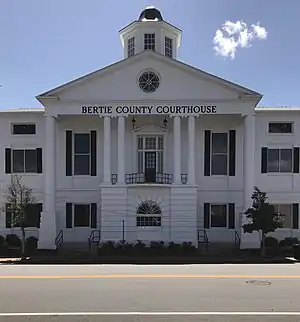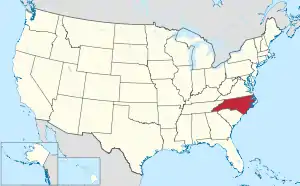Bertie County | |
|---|---|
 Bertie County Courthouse in Windsor | |
 Flag  Seal | |
 Location within the U.S. state of North Carolina | |
 North Carolina's location within the U.S. | |
| Coordinates: 36°03′33″N 76°57′45″W / 36.059043°N 76.962364°W | |
| Country | |
| State | |
| Founded | 1739 |
| Named for | James Bertie and/or Henry Bertie |
| Seat | Windsor |
| Largest community | Windsor |
| Area | |
| • Total | 741.31 sq mi (1,920.0 km2) |
| • Land | 699.18 sq mi (1,810.9 km2) |
| • Water | 42.13 sq mi (109.1 km2) 5.61% |
| Population (2020) | |
| • Total | 17,934 |
| • Estimate (2022) | 17,240 |
| • Density | 25.65/sq mi (9.90/km2) |
| Time zone | UTC−5 (Eastern) |
| • Summer (DST) | UTC−4 (EDT) |
| Congressional district | 1st |
| Website | www |
Bertie County (/ˌbɜːrˈtiː/ bur-TEE)[1][2] is a county located in the northeast area of the U.S. state of North Carolina. As of the 2020 census, the population was 17,934.[3] Its county seat is Windsor.[4] The county was created in 1722 as Bertie Precinct and gained county status in 1739.[5]
History
The county was formed as Bertie Precinct in 1722 from the part of Chowan Precinct of Albemarle County lying west of the Chowan River. It was named for James Bertie, his brother Henry Bertie, or perhaps both, each having been one of the Lords Proprietors of Carolina.
In 1729 parts of Bertie Precinct, Chowan Precinct, Currituck Precinct, and Pasquotank Precinct of Albemarle County were combined to form Tyrrell Precinct. With the abolition of Albemarle County in 1739, all of its constituent precincts became separate counties. As population of settlers increased, in 1741 parts of Bertie County were organized as Edgecombe County and Northampton County. Finally, in 1759 parts of Bertie, Chowan, and Northampton counties were combined to form Hertford County. Bertie's boundaries have remained the same since then.
This mostly rural county depended on the agricultural economy well into the 20th century. In the colonial and antebellum eras, tobacco and cotton were the chief commodity crops, worked by Indian and African slaves. After the Civil War, agriculture continued to be important to the county. In the 21st century, developers have referred to it as being within the Inner Banks region, which is increasingly attracting retirees and buyers of second homes, because of its beaches and landscapes.
Geography
According to the U.S. Census Bureau, the county has a total area of 741.31 square miles (1,920.0 km2), of which 699.18 square miles (1,810.9 km2) is land and 42.13 square miles (109.1 km2) (5.61%) is water.[6]
National protected area
State and local protected areas/sites
- Bachelor Bay Game Land (part)[7]
- Bertie County Game Land[7]
- Chowan Swamp Game Land (part)[7]
- Historic Hope Plantation
- Jamesville Wildlife Preserve
- Lewiston Woodville Preserve
- Lower Roanoke River Wetlands Game Land (part)[7]
- Salmon Creek State Natural Area
- Upper Roanoke River Wetlands Game Land (part)[7]
Major water bodies
- Albemarle Sound
- Beaverdam Swamp
- Cashie River
- Chowan River
- Chinkapin Swamp
- Cucklemaker Creek
- Cypress Swamp
- Falt Swamp Creek
- Hoggard Mill Creek
- Loosing Swamp
- Middle River
- Quioccosin Creek
- Roanoke River
- Stoney Creek
- Wahton Swamp
- Wildcat Swamp
Adjacent counties
- Hertford County – north
- Chowan County – east
- Washington County – southeast
- Martin County – south
- Halifax County – west
- Northampton County – northwest
Major highways
Major infrastructure
- Sans Souci Ferry, river ferry across the Cashie River
Demographics
| Census | Pop. | Note | %± |
|---|---|---|---|
| 1790 | 12,462 | — | |
| 1800 | 11,249 | −9.7% | |
| 1810 | 11,218 | −0.3% | |
| 1820 | 10,805 | −3.7% | |
| 1830 | 12,262 | 13.5% | |
| 1840 | 12,175 | −0.7% | |
| 1850 | 12,851 | 5.6% | |
| 1860 | 14,310 | 11.4% | |
| 1870 | 12,950 | −9.5% | |
| 1880 | 16,399 | 26.6% | |
| 1890 | 19,176 | 16.9% | |
| 1900 | 20,538 | 7.1% | |
| 1910 | 23,039 | 12.2% | |
| 1920 | 23,993 | 4.1% | |
| 1930 | 25,844 | 7.7% | |
| 1940 | 26,201 | 1.4% | |
| 1950 | 26,439 | 0.9% | |
| 1960 | 24,350 | −7.9% | |
| 1970 | 20,528 | −15.7% | |
| 1980 | 21,024 | 2.4% | |
| 1990 | 20,388 | −3.0% | |
| 2000 | 19,773 | −3.0% | |
| 2010 | 21,282 | 7.6% | |
| 2020 | 17,934 | −15.7% | |
| 2022 (est.) | 17,240 | [3] | −3.9% |
| U.S. Decennial Census[8] 1790–1960[9] 1900–1990[10] 1990–2000[11] 2010[12] 2020[3] | |||
2020 census
| Race | Number | Percentage |
|---|---|---|
| White (non-Hispanic) | 6,298 | 35.12% |
| Black or African American (non-Hispanic) | 10,674 | 59.52% |
| Native American | 57 | 0.32% |
| Asian | 63 | 0.35% |
| Other/Mixed | 512 | 2.85% |
| Hispanic or Latino | 330 | 1.84% |
As of the 2020 census, there were 17,934 people, 7,909 households, and 4,733 families residing in the county.
As of the 2020 census, Bertie County had the highest proportion of black residents among all counties in the state.[14]
2010 census
At the 2010 census, there were 21,282 people living in the county. 62.5% were Black or African American, 35.2% White, 0.5% Asian, 0.5% Native American, 0.5% of some other race and 0.9% of two or more races. 1.3% were Hispanic or Latino (of any race).
2000 census
At the 2000 census,[15] there were 19,773 people, 7,743 households, and 5,427 families living in the county. The population density was 28 people per square mile (11 people/km2). There were 9,050 housing units at an average density of 13 units per square mile (5.0 units/km2). The racial makeup of the county was 62.34% Black or African American, 36.30% White, 0.44% Native American, 0.11% Asian, 0.01% Pacific Islander, 0.33% from other races, 0.48% from two or more races. 0.99% of the population were Hispanic or Latino of any race.
There were 7,743 households, out of which 29.70% had children under the age of 18 living with them, 46.00% were married couples living together, 20.10% had a female householder with no husband present, and 29.90% were non-families. 27.00% of all households were made up of individuals, and 13.10% had someone living alone who was 65 years of age or older. The average household size was 2.53 and the average family size was 3.07.
In the county, the population was spread out, with 26.10% under the age of 18, 7.70% from 18 to 24, 26.40% from 25 to 44, 23.80% from 45 to 64, and 16.00% who were 65 years of age or older. The median age was 39 years. For every 100 females there were 87.60 males. For every 100 females age 18 and over, there were 82.00 males.
The median income for a household in the county was $25,177, and the median income for a family was $30,186. Males had a median income of $26,866 versus $18,318 for females. The per capita income for the county was $14,096. About 19.30% of families and 26% of the population were below the poverty line, including 30.70% of those under age 18 and 28.30% of those age 65 or over.
Government and politics
Bertie County is a member of the Mid-East Commission regional council of governments. The County Sheriff is the chief law enforcement officer.
| Year | Republican | Democratic | Third party | |||
|---|---|---|---|---|---|---|
| No. | % | No. | % | No. | % | |
| 2020 | 3,817 | 38.89% | 5,939 | 60.51% | 59 | 0.60% |
| 2016 | 3,456 | 36.97% | 5,778 | 61.82% | 113 | 1.21% |
| 2012 | 3,387 | 33.46% | 6,695 | 66.14% | 41 | 0.41% |
| 2008 | 3,376 | 34.58% | 6,365 | 65.20% | 22 | 0.23% |
| 2004 | 3,057 | 38.06% | 4,938 | 61.48% | 37 | 0.46% |
| 2000 | 2,488 | 34.67% | 4,660 | 64.94% | 28 | 0.39% |
| 1996 | 1,745 | 27.83% | 4,202 | 67.01% | 324 | 5.17% |
| 1992 | 1,756 | 26.04% | 4,382 | 64.99% | 605 | 8.97% |
| 1988 | 2,145 | 36.24% | 3,762 | 63.56% | 12 | 0.20% |
| 1984 | 2,879 | 41.91% | 3,953 | 57.54% | 38 | 0.55% |
| 1980 | 1,695 | 30.10% | 3,863 | 68.59% | 74 | 1.31% |
| 1976 | 1,332 | 24.35% | 4,117 | 75.27% | 21 | 0.38% |
| 1972 | 2,874 | 60.54% | 1,819 | 38.32% | 54 | 1.14% |
| 1968 | 811 | 11.38% | 3,207 | 45.00% | 3,108 | 43.61% |
| 1964 | 931 | 21.84% | 3,332 | 78.16% | 0 | 0.00% |
| 1960 | 577 | 13.55% | 3,682 | 86.45% | 0 | 0.00% |
| 1956 | 469 | 12.21% | 3,373 | 87.79% | 0 | 0.00% |
| 1952 | 384 | 9.74% | 3,557 | 90.26% | 0 | 0.00% |
| 1948 | 85 | 2.68% | 3,034 | 95.71% | 51 | 1.61% |
| 1944 | 124 | 3.80% | 3,142 | 96.20% | 0 | 0.00% |
| 1940 | 98 | 2.90% | 3,287 | 97.10% | 0 | 0.00% |
| 1936 | 115 | 2.92% | 3,828 | 97.08% | 0 | 0.00% |
| 1932 | 65 | 2.02% | 3,154 | 97.83% | 5 | 0.16% |
| 1928 | 374 | 15.75% | 2,000 | 84.25% | 0 | 0.00% |
| 1924 | 159 | 8.16% | 1,785 | 91.59% | 5 | 0.26% |
| 1920 | 212 | 10.33% | 1,840 | 89.67% | 0 | 0.00% |
| 1916 | 116 | 7.36% | 1,461 | 92.64% | 0 | 0.00% |
| 1912 | 43 | 2.57% | 1,571 | 93.79% | 61 | 3.64% |
Education
Public schools in the county are managed by Bertie County Schools. Notable schools in Bertie county include Bertie High School, Lawrence Academy, and Bethel Assembly Christian Academy.[17][18][19] The North Carolina Department of Public Instruction rated the county school system as "low-performing" for the 2021–2022 school year.[20]
Communities

Towns
- Askewville
- Aulander
- Colerain
- Kelford
- Lewiston Woodville
- Powellsville
- Roxobel
- Windsor (county seat and largest community)
Townships
- Colerain
- Indian Woods
- Merry Hill
- Mitchells
- Roxobel
- Snakebite
- Whites
- Windsor
- Woodville
Unincorporated communities
- Ashland
- Avoca
- Baker Town
- Buena Vista
- Elm Grove
- Gatlinsville
- Grabtown
- Greens Cross
- Hexlena
- Merry Hill
- Midway
- Perrytown
- Pine Ridge
- Quitsna
- Republican
- Rosemead
- Sans Souci
- Spring Branch
- Todds Cross
- Trap
- Whites Cross
- Woodard
Population ranking
The population ranking is based on a 2023 estimate of Bertie County.[21]
† = county seat
| Rank | Name | Type | Population (2023 estimate) |
|---|---|---|---|
| 1 | † Windsor | Town | 3,507 |
| 2 | Aulander | Town | 716 |
| 3 | Lewiston Woodville | Town | 400 |
| 4 | Powellsville | Town | 189 |
| 5 | Colerain | Town | 212 |
| 6 | Kelford | Town | 204 |
| 7 | Roxobel | Town | 197 |
| 8 | Askewville | Town | 176 |
See also
- List of counties in North Carolina
- National Register of Historic Places listings in Bertie County, North Carolina
- List of Highway Historical Markers in Bertie County, North Carolina
- Meherrin Indian Tribe, state-recognized tribe that resides in the county
References
- ↑ "NC Pronunciation Guide". WRAL. Retrieved August 16, 2023.
- ↑ Talk Like a Tarheel Archived 2013-06-22 at the Wayback Machine, from the North Carolina Collection website at the University of North Carolina at Chapel Hill. Retrieved 2023-08-16.
- 1 2 3 "QuickFacts: Bertie County, North Carolina". United States Census Bureau. Retrieved May 31, 2022.
- ↑ "Find a County". National Association of Counties. Archived from the original on May 31, 2011. Retrieved June 7, 2011.
- ↑ "North Carolina: Individual County Chronologies". North Carolina Atlas of Historical County Boundaries. The Newberry Library. 2009. Archived from the original on March 4, 2016. Retrieved January 20, 2015.
- ↑ "2020 County Gazetteer Files – North Carolina". United States Census Bureau. August 23, 2022. Retrieved September 9, 2023.
- 1 2 3 4 5 "NCWRC Game Lands". www.ncpaws.org. Retrieved March 30, 2023.
- ↑ "U.S. Decennial Census". United States Census Bureau. Retrieved January 12, 2015.
- ↑ "Historical Census Browser". University of Virginia Library. Retrieved January 12, 2015.
- ↑ Forstall, Richard L., ed. (March 27, 1995). "Population of Counties by Decennial Census: 1900 to 1990". United States Census Bureau. Retrieved January 12, 2015.
- ↑ "Census 2000 PHC-T-4. Ranking Tables for Counties: 1990 and 2000" (PDF). United States Census Bureau. April 2, 2001. Archived (PDF) from the original on March 27, 2010. Retrieved January 12, 2015.
- ↑ "State & County QuickFacts". United States Census Bureau. Archived from the original on June 6, 2011. Retrieved October 17, 2013.
- ↑ "Explore Census Data". data.census.gov. Retrieved December 24, 2021.
- ↑ Melrose, Justyn (June 28, 2023). "What is the racial breakdown of North Carolina's 100 counties?". Fox 8. Nexstar Media Group, Inc. Retrieved October 24, 2023.
- ↑ "U.S. Census website". United States Census Bureau. Retrieved January 31, 2008.
- ↑ Leip, David. "Dave Leip's Atlas of U.S. Presidential Elections". uselectionatlas.org. Retrieved March 14, 2018.
- ↑ "Bertie High School / Homepage". www.bertie.k12.nc.us. Retrieved January 3, 2023.
- ↑ "Lawrence Academy – Excellence in education since 1968". www.lawrenceacademy.org. Retrieved January 3, 2023.
- ↑ "Askewville Assembly - BACA". askewvilleassembly.com. Retrieved January 3, 2023.
- ↑ Taylor, Holly (September 13, 2022). "Local "report cards" show mixed results". The Roanoke-Chowan Herald. Retrieved January 3, 2023.
- ↑ "Bertie County NC - Cities, Towns, Neighborhoods, & Subdivisions". northcarolina.hometownlocator.com. Retrieved April 21, 2022.
External links
 Geographic data related to Bertie County, North Carolina at OpenStreetMap
Geographic data related to Bertie County, North Carolina at OpenStreetMap- Official website
- If You Build It at IMDb , documentary film about an education project in Bertie County
- Raising Bertie at IMDb , documentary film about education in Bertie County
